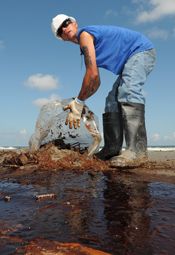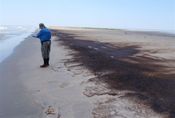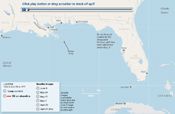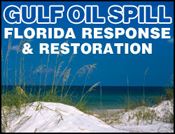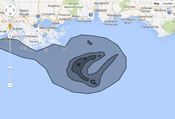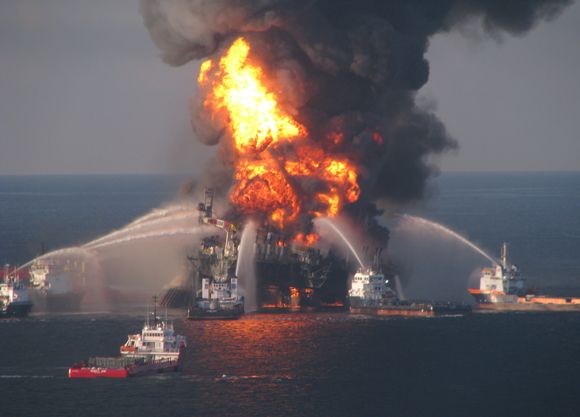
Fire boat response crews battle the blazing off shore oil rig Deepwater Horizon April 21, 2010.____________U.S. Coast Guard photo
"Our worst nightmare has come true."
That opinion was voiced at a May 23 news conference by Plaquemines Parish President Billy Nungesser, who was disappointed with officials from British Petroleum and the federal government for handing out excuses instead of immediate help to stem the flood of oil heading for the sensitive marshlands of Louisiana. And after watching a month of this slow motion train wreck going on in the Gulf of Mexico I would agree with Nungesser that this is an ecological disaster that will be with us for years if not decades.
Watching the oil spill unfold is like watching a slow motion train wreck. We won't really know how bad this will be, or how far the spill will reach, until the leak is stopped and the final scope of the leak can be accurately determined. In the meantime, fellow anglers--those who fish, crab and shrimp the Gulf of Mexico are hurting. Those who are responsible have promised compensation but what price do you put on a way of life that stretches five or more generations?
And what's the fishing situation like now? Well it depends. I tried contacting some people in Louisiana who are in the industry but most declined to comment or we had off-the-record conversations. One of the only written response came from Dayne Larsen, manager at the Uptown Angler fly shop in New Orleans.
"For us the fishing is still good and probably will remain that way for some time," said Larsen. "Most of the marsh has no oil in it at all. There are booms in many places in anticipation of oil (and) about half of our saltwater marsh is closed to fishing. The closing are due to boom blocking waterways, oil and the worry that seafood is contaminated and should not be eaten. We hope maybe they will open some of these areas to catch and release fishing but that is a tough sell to a catch and kill state. Locally, the morale is not really great and we have fishing guides talking about moving. Our future is up in the air and we stay confident that we will continue to have the premier destination redfishing in the country and we hope anglers will keep coming and fishing our amazing marsh."
"We want the country to really understand what this spill means to everyone. Louisiana is a huge seafood producer and the oil has closed down the vast majority of our shrimping waters and virtually all the oyster harvesting. This means that meals at seafood restaurants go way up and you may not even be able to get oysters. This affects everyone! Not to mention tuna fishing and everything else that the gulf produces. Now with oil reaching to Florida we are hoping that more of a response will happen as Florida always seems to have more pull then Louisiana."
It's a scary time and the people who live and work the Gulf of Mexico are worried about the future of the fishing, crabbing and shrimping industry. If you just go by what you see and hear in media reports, all of Louisiana is awash in oil. Well, according to Larsen's report, it isn't. It's still a serious situation where huge swaths of the ocean and coastline have been closed to fishing but there are still hundreds of miles of open coastline and not all of it has been affected by the spill. There are places to fish, where the seafood is still safe to eat, or you can practice catch and release but you need to call around to check on the situation. Those fly shops, tackle shops, bait shacks, restaurants, hotels, motels, car rentals, charter boats and guides, who have access to clean water need the work. Support them if you can.
INFORMATION: Just a point of reference--British Petroleum claims that 5,000 barrels a day (which experts say is on the low side of the leakage) is escaping from the drill site where their Deepwater Horizon oil platform used to be located before it blew up and sank in April. It takes 42 gallons to fill one barrel. And to those who think the correct answer is 50-55 gallons, you're thinking about a drum. It takes 55 gallons to fill one DRUM. A different container. I think 5,000 barrels a day sounds a bit less intimidating than 210,000 gallons a day. The Deepwater Horizon site has been leaking oil for over a month now and they say the leak might not stop until August. An average supertanker carries roughly 2 million barrels of oil, 84 million gallons. You do the math. My head hurts.
